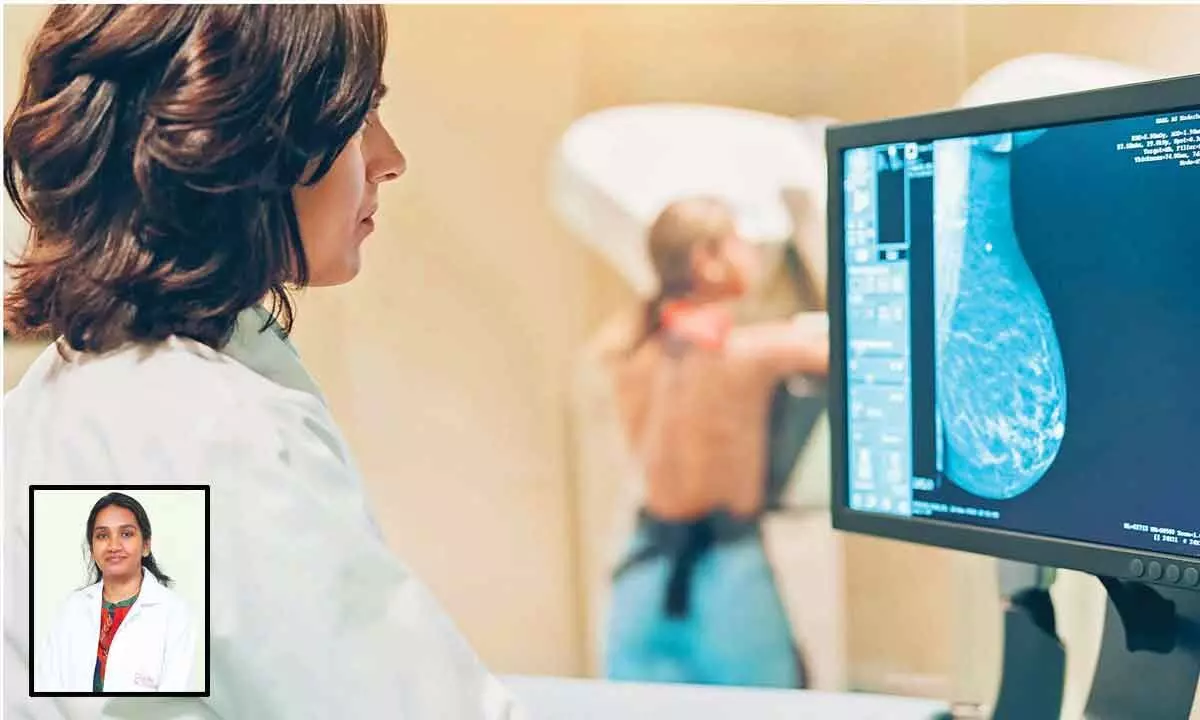Live
- Kumbh Mela 2025: Unique Bus Housing World’s Heaviest Sphatik Shivling Draws Devotees in Prayagraj
- 76th Republic Day of India: Celebrating Heritage and Progress on January 26, 2025
- Bengaluru's AI Traffic Lights to Get Countdown Timers for Smoother Traffic Flow
- Game Changer and Daku Maharaj: AP High Court Imposes Ticket Price Limits
- Theekshana becomes seventh Sri Lanka bowler to claim hat-trick in ODI
- Andhra Pradesh: No First-Year Exams from 2025
- Nara Lokesh Declares State's Ambition to Become a Global Digital Technology Hub
- All Dreams in One Dreame: Dreame Technology Unveils Next-Generation Smart Home Ecosystem at CES 2025
- Wanaparthy collector directs to provide security at EVM warehouse
- Ram Charan: Why the Hate? House Searches, Viral Tweets & More Before Game Changer Release
Just In
Revolutionising breast cancer detection:The role of AI


In a groundbreaking development, Artificial Intelligence (AI) is reshaping the landscape of breast cancer detection, offering unprecedented...
In a groundbreaking development, Artificial Intelligence (AI) is reshaping the landscape of breast cancer detection, offering unprecedented advancements in accuracy, efficiency, and accessibility. As breast cancer continues to be a leading cause of mortality among women worldwide, these innovations hold the promise of saving countless lives.
One of the most significant contributions of AI in breast cancer detection is its application in imaging analysis. Traditional mammography, a crucial tool for early detection, is now being augmented by AI algorithms. These algorithms, trained on vast datasets, can identify minute abnormalities in mammograms with remarkable precision. Studies have shown that AI can detect cancers that radiologists might miss, thereby reducing false negatives and ensuring early intervention.
The advent of 3D mammography, or tomosynthesis, has improved the visualization of breast tissue, but it also generates more complex data. AI excels in analyzing these 3D images, providing radiologists with detailed insights and highlighting potential areas of concern. Similarly, AI applications in MRI scans are enhancing the detection of breast cancer, particularly in women with dense breast tissue where traditional methods may fall short.
Diagnostic errors, including false positives and false negatives, have long been a challenge in breast cancer screening. AI is poised to mitigate these errors through its ability to learn and adapt from each analysis, continuously refining its accuracy. By offering a second opinion to radiologists, AI systems help in cross-verifying diagnoses, leading to more reliable outcomes and reducing the psychological and financial burden on patients due to unnecessary biopsies.
Beyond detection, AI is also playing a crucial role in the personalization of breast cancer treatment. By analyzing patient data, including genetic profiles and treatment histories, AI can help oncologists devise tailored treatment plans that maximize efficacy and minimize side effects. This personalized approach is revolutionizing patient care, offering hope for better outcomes and improved quality of life. In regions with limited access to medical facilities, AI-driven mobile health units equipped with portable imaging devices are making breast cancer screening more accessible. These units can perform screenings in remote areas, with AI algorithms providing immediate analysis and recommendations. This innovation is bridging the gap in healthcare access, ensuring that more women receive timely screenings and interventions.
The integration of AI in breast cancer detection is still in its early stages, but the progress so far is promising. Ongoing research and development are expected to further enhance the capabilities of AI, making it an indispensable tool in the fight against breast cancer. As AI continues to evolve, it holds the potential to not only improve detection rates but also revolutionize the entire spectrum of cancer care, from diagnosis to treatment and beyond.
In conclusion, AI is set to transform breast cancer detection and treatment, offering new hope for patients and healthcare providers alike. With continued advancements, the future of breast cancer care looks brighter, heralding a new era of precision medicine and improved patient outcomes.
(The author is a Consultant, Breast and General Surgeon, Apollo Cradle & Children’s Hospital, Kondapur)

© 2024 Hyderabad Media House Limited/The Hans India. All rights reserved. Powered by hocalwire.com






